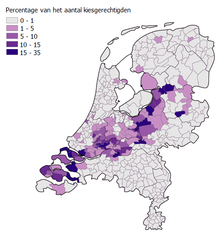- Bible Belt (Netherlands)
-
For the American Bible Belt, see Bible Belt.
 Areas where the Dutch Christian right Reformed Political Party SGP received a significant amount of votes in 2010, largely coextensive with the Dutch Bible Belt.
Areas where the Dutch Christian right Reformed Political Party SGP received a significant amount of votes in 2010, largely coextensive with the Dutch Bible Belt.
The Bible Belt (“De Bijbelgordel” in Dutch, although the English term is most commonly used) is the name given (patterned after the Bible Belt of the United States) to a strip of land in the Netherlands, which is inhabited chiefly by conservative Protestants. The Bijbelgordel stretches from Zeeland, through the West-Betuwe and Veluwe, to the northern parts of the province Overijssel. However, some communities with strong conservative Protestant leanings are situated outside the belt. For example, Urk, considered by many as one of the most traditional communities in the country, and some municipalities of Friesland have characteristics typical of the Bijbelgordel. Other places in this area are Yerseke, Tholen, Ouddorp, Opheusden, Kesteren, Barneveld, Nunspeet, Elspeet and Staphorst. The three biggest cities regarded to be part of the Bible Belt are Ede, Veenendaal and Kampen. Currently, the traditional Dutch churches have around 650,000 members[citation needed] in about 360 churches.
Contents
History
When Flanders and North Brabant were reconquered by the Spanish army during the Eighty Years’ War, their Protestant inhabitants were required to either convert to Catholicism or leave. Many emigrated north of the border, particularly during the Twelve Years’ Truce of 1609 – 1621. Many of them later became staunch supporters of the pietist movement known as the nadere reformatie (further reformation). Following the 1832 schism, known as the Afscheiding (“Secession”) and the 1886 schism, Doleantie (“Sorrow”) led by Abraham Kuyper, they left the mainstream Dutch Reformed Church and founded their own, more conservative congregations, the most notable of which are the Christian Reformed Churches and the Reformed Congregations (“Gereformeerde Gemeenten”), known colloquially as zwarte-kousenkerken (“black stockings churches”).
The Bijbelgordel differs in many aspects (amongst them a regular Sunday church attendance - often twice on a Sunday) from the traditionally Catholic provinces of Noord-Brabant and Limburg to the south (where Sunday church attendance averages between a mere 2% to 3% [1] of the population) and northern parts of the Netherlands, which are traditionally mainline Protestant (dominated by the Protestant Church in the Netherlands[2]) and increasingly secular, with similarly low church attendance figures.
Life and tradition
The Church plays a central role in the life of Bijbelgordel communities and they typically oppose the liberal ways of Dutch life, such as euthanasia, gay rights, abortion etc. In Bijbelgordel communities, strong religious tone in public life is accompanied by conservative outlook, preference for large families (the region has relatively high fertility rates), and an emphasis on traditional values. An aspect of Bijbelgordel society that has drawn the attention of the Dutch general public in recent years (when concerns of a measles epidemic emerged) is the suspicion of parents towards state-run vaccination programmes.[3][4]
The Bijbelgordel provides a base of support for Christian Democratic parties, especially the two (small) Christian parties; SGP and ChristenUnie.
References
- ^ http://www.ru.nl/aspx/download.aspx?File=/contents/pages/465658/rapport581.pdf&structuur=kaski In Dutch - Key Figures Roman Catholic Church for 2008
- ^ http://www.ru.nl/kaski/onderzoek/gegevens/overige/virtuele_map/kerncijfers_2007/ Provides an overview of key figures including Sunday (weekend) church attendance for the Protestant Church in The Netherlands for the year 2007
- ^ [1]
- ^ [2]
External links
- Alexandra Hudson, “Seeking security, Dutch turn to Bible Belt”, (Reuters: March 12, 2007)
Categories:- Belt regions
- Christianity in the Netherlands
- Dutch society
Wikimedia Foundation. 2010.
